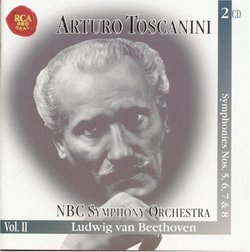| All Artists: Ludwig van Beethoven, Arturo Toscanini, NBC Symphony Orchestra Title: Beethoven: Symphonies Nos. 5-8 Members Wishing: 0 Total Copies: 0 Label: RCA Release Date: 11/24/1998 Genre: Classical Styles: Historical Periods, Classical (c.1770-1830), Symphonies Number of Discs: 2 SwapaCD Credits: 2 UPC: 743215583622 |
Search - Ludwig van Beethoven, Arturo Toscanini, NBC Symphony Orchestra :: Beethoven: Symphonies Nos. 5-8
 | Ludwig van Beethoven, Arturo Toscanini, NBC Symphony Orchestra Beethoven: Symphonies Nos. 5-8 Genre: Classical
|
Larger Image |
CD Details |
CD ReviewsThe Great Toscanini Hermes Camacho | Boulder, CO | 08/01/2001 (5 out of 5 stars) "Toscanini was probably the most dominant maestro the world has ever known. Wherever his presence was felt, whether it be La Scala in Italy, The Met, Philadelphia, or NYP, it lingered even after he left. There have been many stories of when Toscanini left, not only did the quality of the performances diminish, but the respect of the musicians toward his "replacement." Granted it wasn't intentional, but rather a general feeling of incompetence in the new conductor in light of the old. When Toscanini would switch with Stokowski for guest conducting stints between Philadelphia and NYP, utmost respect was exhibited toward Toscanini in Philly, while in New York, the musicians resented Stokowski's different, although masterful and extraordinary, interpretations and style. This reissue of Beethoven's last four great symphonies before the monumental ninth are among Toscanini's best. The fifth symphony is crisp and clean, the trademark Toscanini style (everyone talks about Stokowski's "Philadelphia Sound" or rather "Stokowski Sound," but what about the "Toscanini Sound?"). It is probably not the best of his numerous Symph. 5 recordings, but it is still very good. The climactic section in the coda leading to the four note heavy segment is hair-raising (the descending eigth note line in the violins into the driving four note phrases). His tempos are superb and closer to the proper tempo as compared to most maestri of the day. The second movement is quite lilting, lyrical, yet with an air of majesty and nobility. The third movement scherzo continues the sound of majesty and the transition into the finale is not only powerful, but right on target to Beethoven's original tempo marking (from 96 to 84). The Seventh is a treasure, like always, but the trumpet, from time to time, particularly in the fourth movement, comes out a little too much more than it should (I imagine it an engineering fault -- Toscanini would never have permitted an overzealous trumpet). The Finale of the seventh is poweful and triumphant, and again, follows Beethoven's tempo (It seems as if in the recapitulation, 3 or so minutes into the movement, the sound seems to become STEREO. It's quite amazing the sound quality change). Even the second movement, which is still a little under Beethoven's tempo, is faster than was accepted in Toscanini's time...it was Toscanini's relentless servitude to the composer to follow the score to the letter and/or help (not re-write) the composer's intentions see light. It's a recording worth buying, but for the best recording of the Seventh Symphony, turn to his 1936 NYP recording...it is spectacular, particular the last movement. Still, this recording was good enough for Toscanini (as he had the final approval), and is a superior recording to many of the old, and even new school of conducting and conductors. Germans play German music right? Furtwangler, Karajan, Klemperer, Bohm? No! The Italian Toscanini." Still the archtypal Beethoven conductor madamemusico | Cincinnati, Ohio USA | 08/28/2001 (4 out of 5 stars) "In Toscanini's lifetime, he was often reviled--particularly by Europeans--for his supposedly "insensitive" Beethoven and Brahms, but as time has receded from his active career we now recognize that he was merely too far ahead of his time. His 1933 Beethoven 5th with the NY Phil, also available on CD (and quite beautiful in its own way), is much more of its time: tempo fluctuations, rhetorical phrasing and a perhaps too-wide dynamic range that leads to certain notes being almost inaudible. In this set, however, it is only the 7th symphony that suffers from a tight, tense, inflexible reading, not to mention poor, boxy sonics that kill the conductor's intent. This 5th, once one gets past the slightly rushed first movement, is a model of classical balance and elegance; the 6th is moving in its emotional but unsentimental delineation of the score (though his BBC 6th is better); and the 8th is unsurpassed in its sweeping drama. In short, a fine addition to the "new" Toscanini legacy, for now and in the future." Thank God For Toscanini! Michael Newberry | Santa Monica | 07/28/2000 (5 out of 5 stars) "What is there to say about Toscanini, but that he is the greatest conductor I have ever heard. His integration of structure, momentum, and detailed expression is without peer. I don't know how its possible but the first cord from each of these Symphonies, seems to set the whole in motion. He creates an overwhelming sense of anticipation, moves through waves of feeling, and then lets loose with cataclysmic precision. And he does something that I have rarely heard, but he makes every note seem as if it's a human expression. I don't mean that its as if it was made by the thought or feeling of the composer, but that the orchestra itself is an intensely passionate and intelligent animal whose form of expression is solely by sound. His interpretations never sound like musical abstractions, which are how most conductors' interpretations sound to me. There is something primordial in hearing Toscanini, that feeling makes me recall that someone said that the first musical instrument was the voice. The sound, for '52 recordings, is remarkably good, really! And the booklet has wonderful insights and factual notes about Toscanini and these Beethoven Symponies."
|

 Track Listings (9) - Disc #1
Track Listings (9) - Disc #1